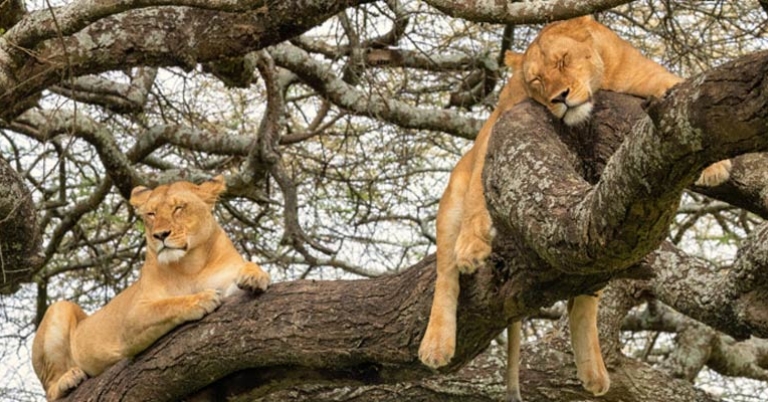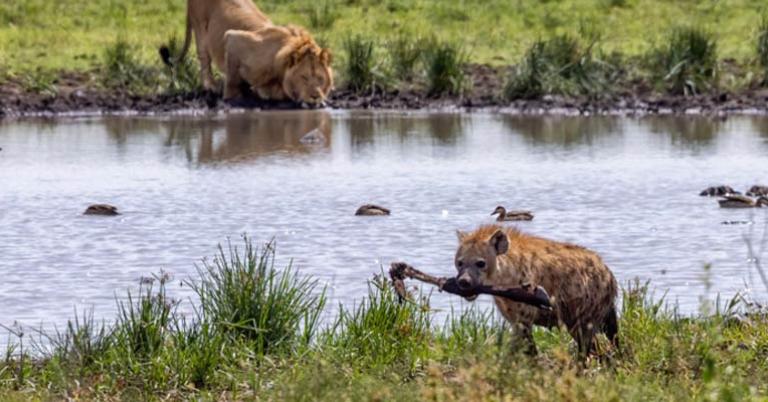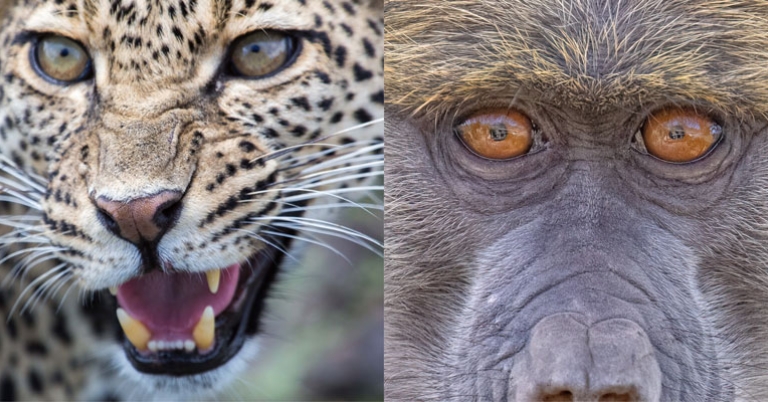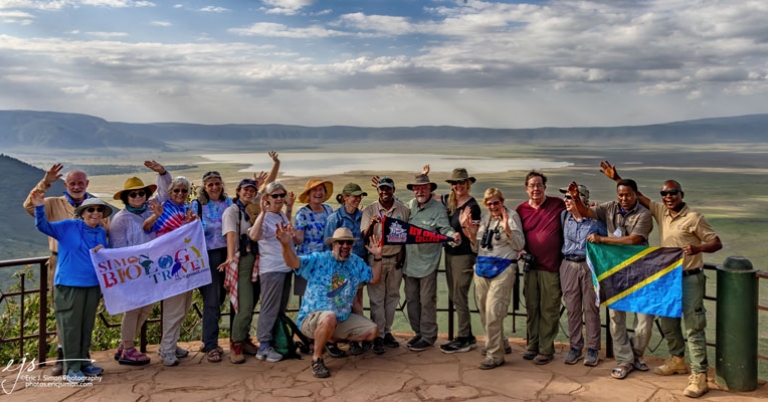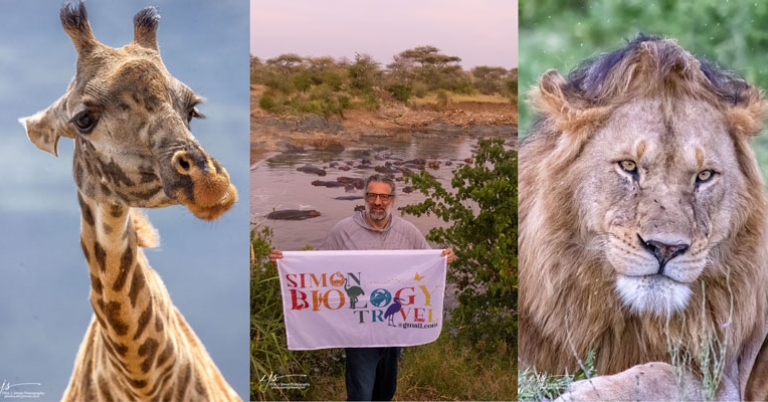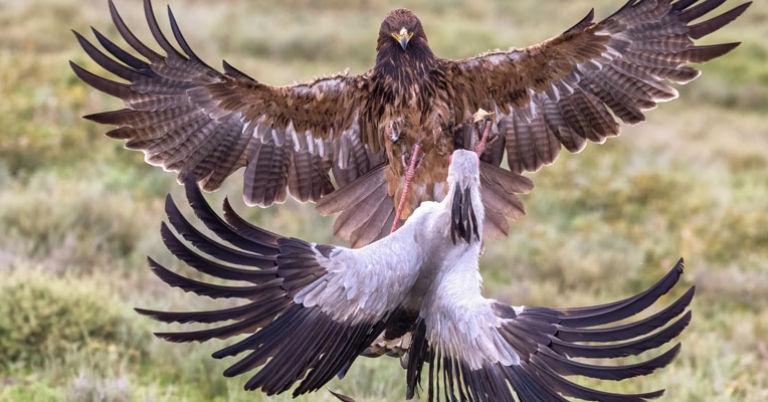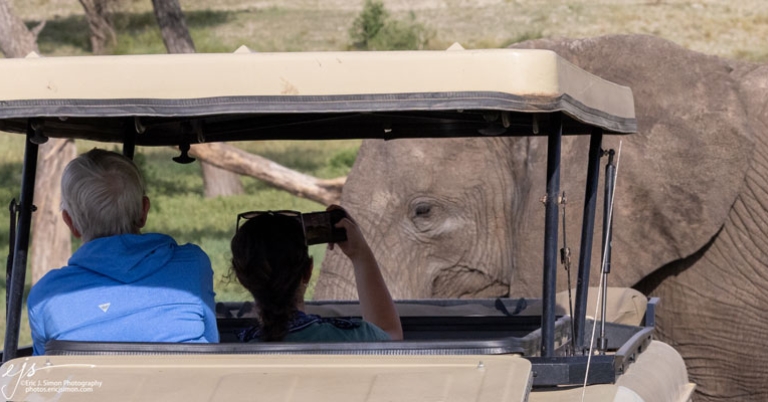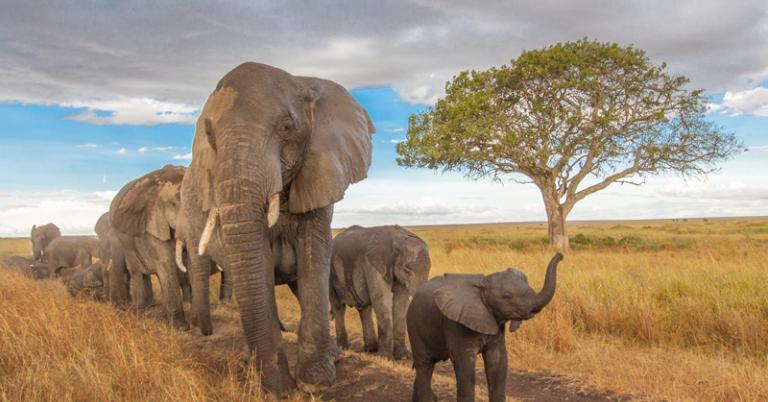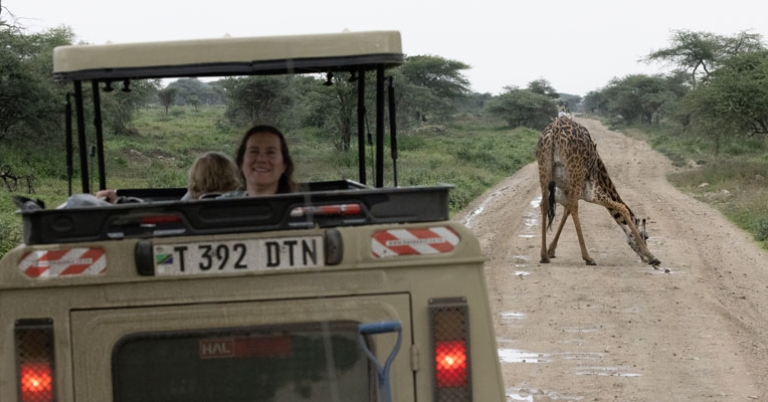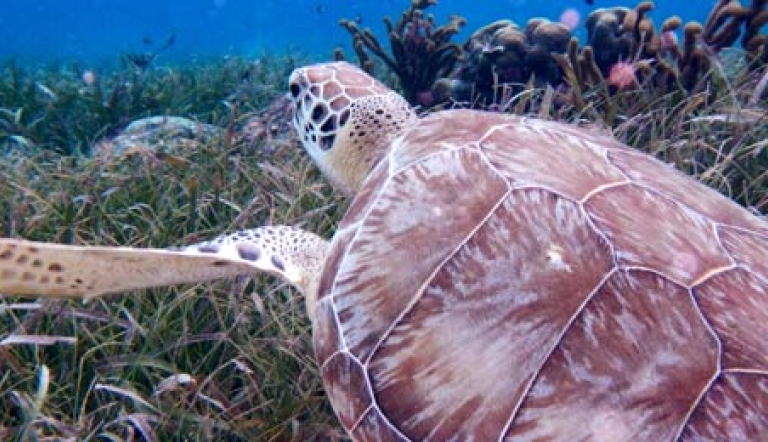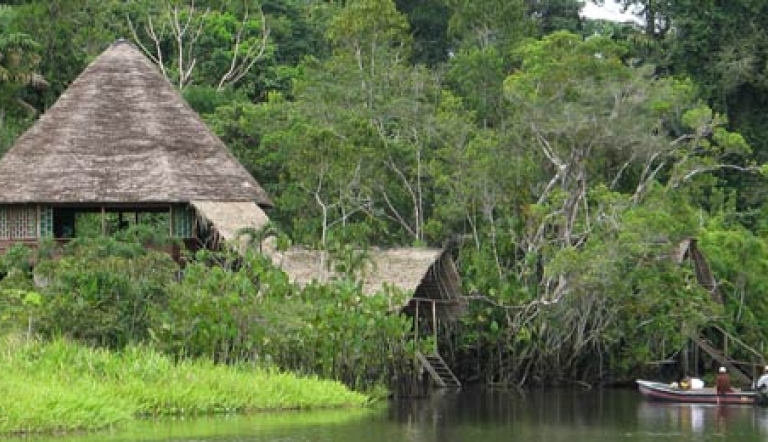SimonBiology Travel: Tanzania Safari with a Purpose
Overview
 Tanzania calls to mind vast landscapes dotted with herds of wildlife, lions lounging on sun-drenched rocks, and mighty elephants trundling through tall grasses. This 13-day journey begins in Arusha, where you will oversee and accompany the transport of over 8 tons of local ingredients to two primary schools, providing them with six months of hot lunches. Learn about the Tanzanian secondary educational system and meet the remarkable students and teachers who are transforming lives through education. Culminate the experience with several days in Tarangire National Park, at Ngorongoro Crater, and then in Serengeti National Park to witness the world-famous Great Migration. Observe the incredibly abundant wildlife including wildebeest, zebras, elephants, giraffes, hippos, baboons, and much more.
Tanzania calls to mind vast landscapes dotted with herds of wildlife, lions lounging on sun-drenched rocks, and mighty elephants trundling through tall grasses. This 13-day journey begins in Arusha, where you will oversee and accompany the transport of over 8 tons of local ingredients to two primary schools, providing them with six months of hot lunches. Learn about the Tanzanian secondary educational system and meet the remarkable students and teachers who are transforming lives through education. Culminate the experience with several days in Tarangire National Park, at Ngorongoro Crater, and then in Serengeti National Park to witness the world-famous Great Migration. Observe the incredibly abundant wildlife including wildebeest, zebras, elephants, giraffes, hippos, baboons, and much more.
Highlights
- Visit two primary schools and learn about their curriculum, successes, and challenges.
- Meet school children, their parents, and local governmental and school officials.
- Descend into Ngorongoro Crater, a collapsed caldera sometimes called the “eighth wonder of the world,” where zebras, lions, and wildebeest can be seen.
- Observe the Great Migration in Serengeti National Park and spend four nights at a luxury tent camp observing incredibly abundant wildlife.
- Enjoy the chance to observe Africa’s “Big Five” up-close: lions, leopards, elephants, water buffaloes, and rhinos.
Meet your leader
 Eric J. Simon
Eric J. Simon
Eric J. Simon, Ph.D., is a Professor in the Department of Biology and Health Science at New England College, in Henniker, New Hampshire. Dr. Simon has led over a dozen international trips to learn about biology and culture to such destinations as Belize, Patagonia, Galapagos, Tanzania, the Amazon, and Cuba. As a biology author, Dr. Simon has over 2 million books in print, translated into 7 languages, and used in over 40 countries.
$9,995
Per person
About this price
Land cost only. Does not include round-trip airfare to and from destination.
Single room supplement $675
What makes us different
Rich content
Community service
Wildlife up-close
Local cuisine
Cultural Discovery
Expert guides
Daily Itinerary
Print ItineraryDepart
Arusha
Tarangire
Tarangire
Ngorongoro
Ngorongoro
Southern Serengeti
Southern Serengeti
Serengeti
Serengeti
Serengeti
Arusha
Home
Pricing
Print Pricing$9,995
Per person
About this price
Land cost only. Does not include round-trip airfare to and from destination.
Single room supplement $675
What's Included
- Arrival and departure transfers based on individual flight schedules
- Full time driver/guide for the duration of your program
- Activities and meals as mentioned in itinerary
- All tips
- Safari vehicle with 6 passengers per vehicle with guide/driver
- Donation for food purchase
- Water refill station during transfers
- Non alcoholic beverage with meals
- Flying Doctors membership
- Carbon Offset
What's Not Included
- International airfare
- Items of personal nature
- Travel Insurance
Pricing Details
A deposit of $350 is required for participants to register and reserve space on the program. Reservations submitted beyond the final payment deadline noted below will require full payment to enroll. 120 or more days before departure: $100 cancellation fee; remaining balance is refunded. 119 - 96 days before departure: full deposit of $350 is forfeited.
Holbrook Travel strongly recommends the purchase of travel protection for medical emergencies while traveling and to protect your investment. Please note the purchase of Cancel for Any Reason Coverage or to exclude pre-existing conditions with Trip Cancellation coverage may require policy purchase within 10-14 days of your initial deposit, depending upon the provider.
Single room supplement $675
Final payment due date: October 08, 2026
Travel Info
Print Travel InfoEntry & Exit Requirements
U.S. citizens must have a valid passport to enter Tanzania. Passports must be valid for at least six months after the date of entry and have at least one blank page available.
A tourist visa is also required for entry. An e-visa can be obtained online in advance by completing the e-visa application form and making payment online with a credit card (Visa or Mastercard) or bank transfer at https://visa.immigration.go.tz. Processing can take up to 10 days; please allow yourself sufficient time prior to travel. If the e-visa is approved, you will receive a “grant notice” via email. You must present a printed copy of the grant notice to the Immigration Officer on arrival at the airport in Tanzania.
U.S. citizens may also opt to obtain a tourist visa upon arrival at the airport in Tanzania, though we do not recommend this option. Expect delays if you choose to obtain a visa at the airport. Be prepared to pay in cash, as credit card payments can be unreliable due to connectivity issues.
The visa fee is USD $100 for a 12-month multiple-entry visa (subject to change).
If you are not traveling with a U.S. passport, please check with the Tanzanian Embassy for the requirements based on your nationality.
Health Information
IMMUNIZATIONS
The Centers for Disease Control recommends that all travelers be up to date on routine vaccinations such as measles-mumps-rubella (MMR) vaccine, diphtheria-pertussis-tetanus vaccine, varicella (chicken pox) vaccine, and your yearly flu shot before every trip.
There are no vaccinations required for entry into Tanzania, unless you are traveling from a country where yellow fever transmission is a risk, in which case proof of yellow fever vaccination is required.
Additionally, the CDC recommends inoculation against hepatitis A, hepatitis B, and typhoid for most travelers to Tanzania.
Please consult your physician for additional information and recommendations based on your individual circumstances.
MALARIA
The CDC warns that travelers to Tanzania may be at risk for exposure to malaria. Malaria is caused by a parasite found in Anopheles mosquitos, which are active from dusk until dawn. Prevention is twofold: the use of anti-malarial drugs and the prevention of insect bites. If you choose to use an anti-malarial drug, as recommended by the CDC, see your physician for a prescription.
To protect against mosquitos, the CDC recommends that you cover exposed skin with lightweight, long-sleeved shirts and pants, consider treating clothes with permethrin, and use an insect repellent containing an EPA-registered active ingredient like DEET, picaridin, or oil of lemon eucalyptus (OLE). Apply sunscreen first, followed by the repellent, ideally 20 minutes later.
Be careful when applying products containing DEET, as it can damage or dissolve certain synthetic fabrics as well as plastic, rubber, vinyl, or elastic materials, such as those used in camera equipment, binoculars, phone cases, sunglasses, or watches. Additionally, some research suggests that when DEET and picaridin enter local waterways, they can be harmful to amphibians and other wildlife. When selecting a repellent, it is ultimately up to each traveler to weigh the risks and benefits of different options, keeping in mind both environmental factors and the importance of protecting against illness.
OTHER INSECT-BORNE ILLNESSES
In addition to malaria, the CDC warns that travelers may be at risk for other illnesses transmitted by mosquitos, ticks, or sand flies, such as dengue fever, chikungunya, African tick-bite fever, and others. Travelers are advised to protect themselves against insect bites using the measures noted above.
After spending time outdoors, especially in grassy or wooded areas, the CDC recommends showering and conducting a full-body check for ticks. If you find a tick attached to your skin, safely remove it as soon as possible.
WILDLIFE
Follow all instructions from your guides regarding wildlife. Animals may become aggressive to protect themselves, their young or their mates, or to guard a food supply. Do not make sudden movements either toward or away from them, as this may be interpreted as threatening or territorial. Avoid stray dogs, as they may carry rabies. In the unlikely event of being bitten, clean the wound and control bleeding. Seek medical attention immediately.
Parasites & Bacteria
Avoid swimming or bathing in freshwater lakes or rivers. Some freshwater bodies contain disease-causing parasites or bacteria that may be contracted through contact with infected water.
SUN EXPOSURE
The effects of the sun can be damaging to the eyes and skin. Spending time outdoors exposes you to the sun’s harmful ultraviolet (UV) rays, even on cloudy days. To protect yourself from the sun, use a broad spectrum sunscreen of at least SPF 15, protect skin with clothing, wear a wide-brimmed hat and sunglasses, and drink plenty of fluids.
CPAP Machines
Some safari lodges and tented camps in remote areas of Tanzania supply electricity through generators or solar power, and shut off electrical power during part of the night in order to conserve energy. If you use a CPAP machine, please be prepared to bring a battery pack (and any necessary cables) to power your equipment when electricity is not available. The battery pack can be charged during the day in preparation for nighttime use. Please be aware that if you do not have a battery pack, some lodges may assess a fee to run electricity through the night.
Travelers Diarrhea
The CDC warns that travelers’ diarrhea is one of the most common travel-related illnesses worldwide. Consumption of contaminated food and water may cause diarrhea. To avoid this, do not drink tap water, and use bottled water to brush your teeth. Avoid ice and uncooked vegetables or fruit without a peel. When in doubt, ask your guide. Restrict yourself to cooked food at restaurants, and avoid food sold on the streets. If you contract diarrhea, it is important to drink large quantities of purified water. Consult your doctor for appropriate medication should you experience diarrhea.
Altitude Sickness
At elevations above 5,000 feet, altitude sickness is a possibility. Stay hydrated and well-rested, and avoid heavy, fatty foods and alcohol in the days before arrival. Consult your physician prior to travel for advice specific to your situation.
Respiratory Illness Protocols
Please review our Respiratory Illness Protocols page, which explains our policy and procedures if you or another traveler should develop symptoms of a respiratory illness during your trip. Your participation in a Holbrook Travel program indicates that you are in agreement with these protocols.
Resources
Print ResourcesPacking Recommendations
Everyone has personal preferences when it comes to packing; for this reason, the information below is offered as a general guide and not a definitive list. You know yourself best: Use your discretion and pack what you think will serve you, based on your personal preferences and specific itinerary.
You may find many of the items below in the New Headings Gear Store. Use code HolbrookGuest10 for a 10% discount on your purchase.
CLOTHING
Casual, comfortable clothing is suitable for most activities in Tanzania. You may wish to bring a slightly nicer outfit or two if your itinerary includes dinners out or more formal activities.
Bring enough clothing suitable for the length of your program. If you prefer to pack light, note that many hotels offer laundry services (at additional cost). If you plan to hand-wash items, remember that humidity may delay drying time.
Pack clothing that can be worn in layers to adapt to weather changes throughout the day. Clothing that wicks away moisture and dries quickly is recommended.
Bring clothes in neutral or muted colors such as green, khaki, brown, or gray. We recommend that you avoid wearing white as it can easily be spotted by animals, and it gets dirty quickly. In addition, black and bright or dark blue may attract tsetse flies, which have a painful bite. Regardless of clothing color, tsetse flies can bite through fabric, so wearing loose-fitting and/or layered clothing can help protect against bites, as can wearing a pair of thick hiking socks, especially on days when you are most likely to encounter them (such as in Tarangire National Park) .
Please note that army-style camouflage clothing is illegal in Tanzania.
Locals tend to dress conservatively. Tank tops and shorts cut above the knee are typically not recommended in public.
- A combination of short-sleeved and long-sleeved shirts
- Shorts
- A combination of lightweight, quick-drying long pants and medium-weight pants or trousers
- Undergarments
- Sleepwear
- Light- to medium-weight jacket or sweater/sweatshirt – Evenings can be cold, especially in desert areas, on the Ngorongoro Crater rim, and during May-August
- Bathing suit – Some hotels have pools.
- Socks – Bring extra pairs.
- Shoes – Consider your specific itinerary when choosing footwear. For most programs, you’ll likely want at least one pair of comfortable, closed-toe walking or hiking shoes with thorn-proof soles, suitable for forest hikes and walking over cobblestones or other uneven terrain. Sturdier hiking boots may be appropriate for more active itineraries. In addition, many participants opt for a pair of sturdy sport-strap sandals (e.g. Keens, Tevas, or similar), plus a pair of casual flip-flops or sandals for around your hotel.
- Lightweight rain jacket, hooded poncho, and/or windbreaker
- Visor or wide-brimmed sun hat
- Bandana, scarf, or neck gaiter
Personal Toiletries
Pack toiletries based on your personal preferences and habits.
- Shampoo, conditioner, lotion, deodorant/antiperspirant , etc. – If possible, avoid strong fragrances if you are sensitive to insect bites and to be considerate of your fellow travelers.
- Soap and washcloth or a small, quick-drying microfiber towel – Washcloths are not standard in all hotels. If you normally use a washcloth, you may wish to bring one from home.
- Hairbrush, comb, hair ties, shower cap
- Toothbrush and toothpaste
- Razor
- Ear plugs, especially if you are a light sleeper
- Personal hygiene products
- Insect repellent
- Sunscreen and lip balm with SPF
- A travel pack of tissues – also useful as napkins or toilet paper if needed
In addition to your personal toiletries, it is useful to pack a small medical kit, which you can easily prepare. Helpful items might include: bandages, antihistamine, a pain reliever, motion sickness and/or altitude sickness medication (if you are prone to either), anti-diarrhea medicine, powdered electrolyte packets for dehydration, aloe vera gel for sunburn, individually wrapped pre-moistened towelettes and/or hand sanitizer, antibiotic ointment, anti-fungal cream, moleskin for blisters, eye drops, tweezers, a mini sewing kit, and an extra pair of disposable contact lenses or eyeglasses if you wear them.
Miscellaneous
Remember to pack valuables such as your passport, cash/credit cards, and medications in your carry-on luggage.
- Passport and photocopies of all travel documentation
- Personal insurance card and travel insurance information
- Money – ATM/credit card, traveler's checks, and/or cash; small bills in good condition are recommended
- Prescription medicines (if applicable), with a copy of the prescription
- Yellow fever certificate (if required; only if you're traveling from a country where yellow fever transmission is a risk)
- Sunglasses with strap
- Small day pack for hikes and excursions
- Flashlight and/or head lamp
- Travel alarm clock or inexpensive waterproof wristwatch with alarm – Not all hotels provide alarm clocks.
- A pocket calculator or phone to assist with conversions and currency exchange
- Binoculars with lens cleaner
- Camera and related equipment, such as charger, lenses, and extra memory cards
- Reusable water bottle – The safari vehicles are equipped with large water jugs. Please bring your own personal water bottle that can be refilled from the jugs during wildlife-viewing drives.
- Non-perishable snacks
- Pocket-knife or multipurpose tool – Pack in your checked luggage.
- Notepad or travel journal and pen
- Travel seat cushion – Seats in the safari vehicles are cushioned, but if you normally have hip or back problems, you may appreciate having some extra padding on the bumpy roads.
- Music or reading material for down time, long bus drives, or on the airplane, and a portable bright light to read by
- Collapsible walking stick with rubber tip – Pack in your checked luggage.
- A small quantity of laundry detergent if you’ll be washing clothing by hand
- Money belt
- Voltage converter and plug adapter
- Chargers for electronics
Additional Packing notes
Be aware that Tanzania has banned single-use plastics. Visitors are requested to avoid bringing plastic bags into the country. This includes garbage bags and grocery/shopping bags. Zip-top style bags specifically used to carry toiletries per TSA’s liquids rule are still permitted on the assumption that they will be reused on the return flight. Items purchased at the airport before boarding the aircraft should be removed from plastic bags. Please double-check your carry-on luggage before disembarking in Tanzania; any plastic bags should be left on the plane to avoid delays and possibly fines.
Although comfortable, safari vehicles are primarily utilitarian in nature and have very limited storage space. For this reason, we ask you to be mindful of what you bring for this program, traveling only with the essentials, and to please use a soft-sided duffel bag (no longer than 22 inches) as your main piece of luggage. In addition to your duffel bag, there will also be room for a medium-sized carry-on item (e.g. a camera bag, purse, or lightweight daypack).
If you do not have a duffel bag, please advise Holbrook or your trip host in advance of the trip. Then, at your first program orientation in Tanzania, your local guide will be able to provide a canvas duffel (one per person) for you to pack what you will need during the program. We will securely store your empty suitcase until the last day of the program, at which time you will be able to retrieve your suitcase and re-pack in preparation for your flights home. The dimensions of the provided duffel bag are 22 in x 11.8 in x 11 in (56 cm x 30 cm x 28 cm).
To protect against dust, you may wish to bring a bandana to cover your face, and a microfiber cloth or other covering for your binoculars and/or camera equipment.
During wildlife-viewing drives, you'll be spending much of your time in the vehicles, so heavy-duty hiking boots aren't needed; closed-toe walking shoes or sneakers are usually sufficient. A pair that easily slips on and off will allow you to stand on the seats of the safari vehicle for a better view when the roof hatch is open.
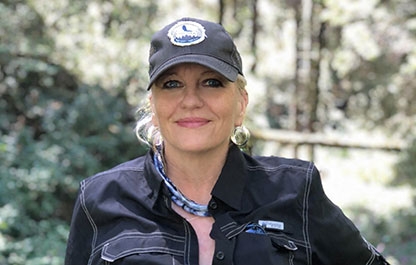
Questions
Contact Lisa Palmese-Graubard at 800-451-7111 x339 or lisa@holbrooktravel.com.
